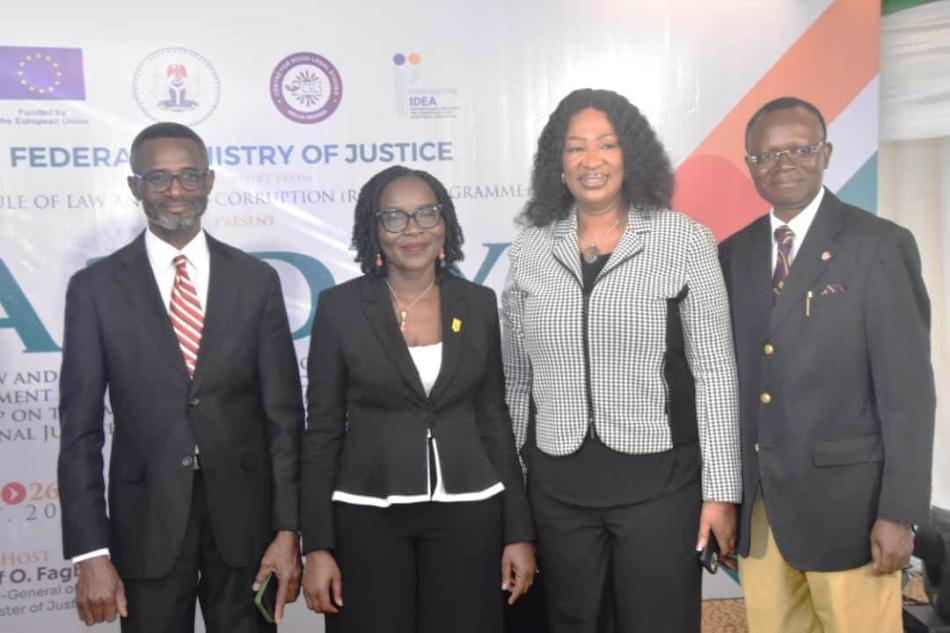Stakeholders adopt National Minimum Standards
Gift Wada
The Attorney-General of the Federation and Minister of Justice, Lateef Fagbemi, SAN, alongside key stakeholders in the justice sector, have taken significant steps to ensure uniformity in the implementation of the Administration of Criminal Justice Act (ACJA) 2015.
Fagbemi announced this development in Abuja, after the stakeholders’ meeting for the inauguration of the committee for the review and validation of the national minimum standards documents on the implementation of the ACJA. Organized by the Federal Ministry of Justice with support from the European Union-funded Rule of Law and Anti-Corruption (RoLAC-II) Programme of the International Institute for Democracy and Electoral Assistance (International IDEA), the event culminated in the adoption of the National Minimum Standards Document 2024 on the implementation of the Act.
Speakers at the event emphasized that the introduction of the National Minimum Standards will significantly enhance the effective implementation of the ACJA, 2015. The RoLAC-II Programme aims to improve the performance, quality, and oversight of the criminal justice system and justice service delivery in Nigeria.
According to Mr. Badejogbin Oluwatoyin, Manager of Component 1 – Criminal Justice Reform under the RoLAC-II Programme, the project aims to establish a national scheme for assessing and evaluating the implementation of the ACJA/ACJLs and a national scoresheet indicating the performance of each state. This initiative seeks to provide a common basis for evaluating the implementation of criminal justice reforms, promote healthy competition among states, and attract more resources to the criminal justice sector.
The document covers several areas, including pre-trial case management, witness support, case filtering and timelines, bail, remand protocol, trial case management, and post-trial procedures. Participants also encouraged the use of plea bargains and agreed that the stay of trial proceedings due to an interlocutory application or appeal should be prohibited.
The National Minimum Standards for the Implementation of ACJA 2015 were designed to consolidate rule of law and anti-corruption reforms, a key component of the programme aimed at enhancing the criminal justice system and justice service delivery in the Federal Capital Territory, Abia, Adamawa, Anambra, Edo, Kano, Lagos, and Plateau states.
During his presentation, Professor Yemi Akinseye-George of the Center for Socio-Legal Studies (CSLS) emphasized the need to deepen the implementation of the ACJA and the ACJLs of States.
In a keynote address, Attorney-General of the Federation and Minister of Justice, Lateef Fagbemi, SAN, represented by the Solicitor General of the Federation and Permanent Secretary of the Federal Ministry of Justice, Mrs Beatrice Jessy-Agba, noted that the federal government enacted the ACJA in 2015 to ensure harmonious implementation of criminal justice reforms across the federation. He explained that the Act promotes efficient management of criminal justice institutions, speedy dispensation of justice, and the protection of the rights and interests of suspects, defendants, and victims in Nigeria.
“The adoption of the Act by States ensures that offenders cannot escape justice by moving from state to state, a practice commonly known as forum shopping. Improved and uniform implementation of criminal justice reforms across the country will leave no escape route for criminals, contributing to socio-economic development in Nigeria,” he said.
He added that the National Minimum Standards have been developed to implement the ACJA and consolidate collaboration between stakeholders in justice delivery by ensuring that courts at both the federal and state levels apply similar standards in criminal procedures and enforcement of criminal justice.

Chairman of the Body of States Attorneys-General, Dr. Ben Odoh, represented by Nassarawa AG, Labaran Shaibu Magaji, described the initiative as significant, capable of creating a balanced and inclusive justice system that safeguards the rights of all parties and strengthens legal frameworks.
Other speakers included representatives from the Nigerian Bar Association (NBA), the Nigerian Police, ICPC, EFCC, and NCoS, among others.
In her welcome address, the Director of the Administration of Criminal Justice and Reform Department (ACJRD) at the Federal Ministry of Justice, Mrs Leticia Ayoola-Daniels, stated that the initiative stems from the growing need for a unified framework to address persistent gaps in the implementation of the ACJA and ACJLs across the country. She identified challenges such as court congestion, unavailability of data, delayed trials, and a lack of uniformity in criminal justice processes, assuring that finalizing the document will significantly address these issues.
Associate Project Officer, ROLAC II, International IDEA, Mr Peter Omenka, stressed that the entity would continue to support the process and create awareness to ensure the documents are translated into different languages.
“RoLAC is ready to support the process and create awareness in such a way that the documents are translated into different languages,” he said.
